Head restraints

 WARNING
WARNING
Head restraints supplement the other vehicle
safety systems. They may provide additional
protection against injury in certain
rear end collisions. Adjust the head restraints
properly, as specified in this section.
Check the adjustment after someone
else uses the seat. Do not attach anything
to the head restraint stalks or remove the
head restraint. Do not use the seat if the
head restraint has been removed. If the
head restraint was removed, reinstall and
properly adjust the head restraint before an
occupant uses the seating position. Failure
to follow these instructions can reduce the
effectiveness of the head restraints. This
may increase the risk of serious injury or
death in a collision.
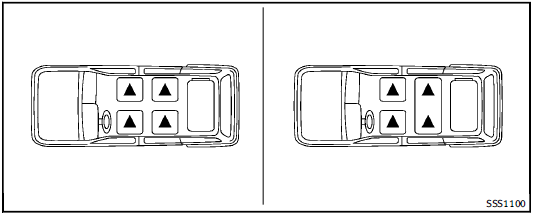
The illustration shows the seating positions equipped with head restraints. The head restraints are adjustable.
Indicates the seating position is equipped with a head restraint.
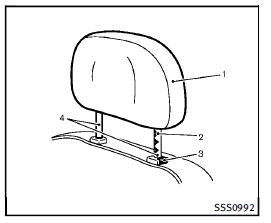
Components
1. Head restraint
2. Adjustment notches
3. Lock knob
4. Stalks
Adjustment
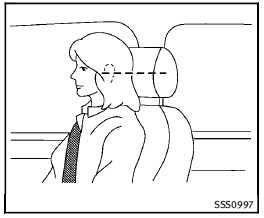
Adjust the head restraint so the center is level with the center of your ears.
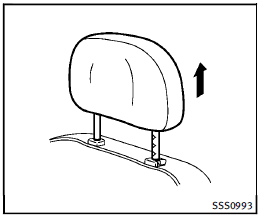
To raise the head restraint, pull it up.
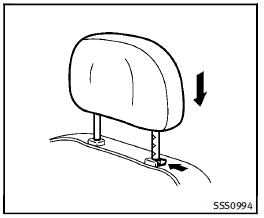
To lower, push and hold the lock knob and push the head restraint down.
Removal
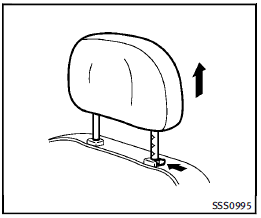
Use the following procedure to remove the adjustable head restraints. 1. Pull the head restraint up to the highest position. 2. Push and hold the lock knob. 3. Remove the head restraint from the seat. 4. Store the head restraint properly in a secure place so it is not loose in the vehicle. 5. Reinstall and properly adjust the head restraint before an occupant uses the seating position.
Install
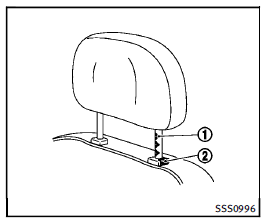
1. Align the head restraint stalks with the holes in the seat. Make sure that the head restraint is facing the correct direction. The stalk with the adjustment notches 1 must be installed in the hole with the lock knob 2 . 2. Push and hold the lock knob and push the head restraint down. 3. Properly adjust the head restraint before an occupant uses the seating position.
 CAUTION
CAUTION
Models with a head restraint display (if so
equipped) are designed so that the head
restraint cannot be removed. The head
restraint display may be damaged if the
head restraint is forcibly pulled out.
Front-seat Active Head Restraint
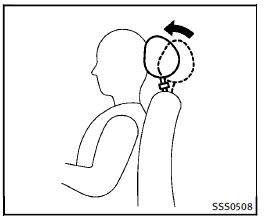
The Active Head Restraint moves forward utilizing the force that the seatback receives from the occupant in a rear-end collision. The movement of the head restraint helps support the occupant’s head by reducing its backward movement and helping absorb some of the forces that may lead to whiplash-type injuries. Active Head Restraints are effective for collisions at low to medium speeds in which it is said that whiplash injury occurs most. Active Head Restraints operate only in certain rear-end collisions. After the collision, the head restraints return to their original position. Adjust the Active Head Restraints properly as described earlier in this section.
See also:
2011 Infiniti G37 Review
The second-generation Infiniti G satisfies both the left and right brain: It's fun to drive and nicely appointed, yet it's reliable and less expensive than many competitors. If I age half so well, I ...
Automatic climate control (Type B)
1. “AUTO” automatic climate control ON button/Temperature control dial2. Air flow control button3. “” Fan speed control dial4. “OFF” button5. “” front defroster button6. “” rear window defroster but ...
Interior lights
MAP LIGHTS
Push the button as illustrated to turn the
light on or off.
REAR PERSONAL LIGHTS
Push the button as illustrated to turn the
light on or off.
INTERIOR LIGHT CONTROL SWITCH
The ...
